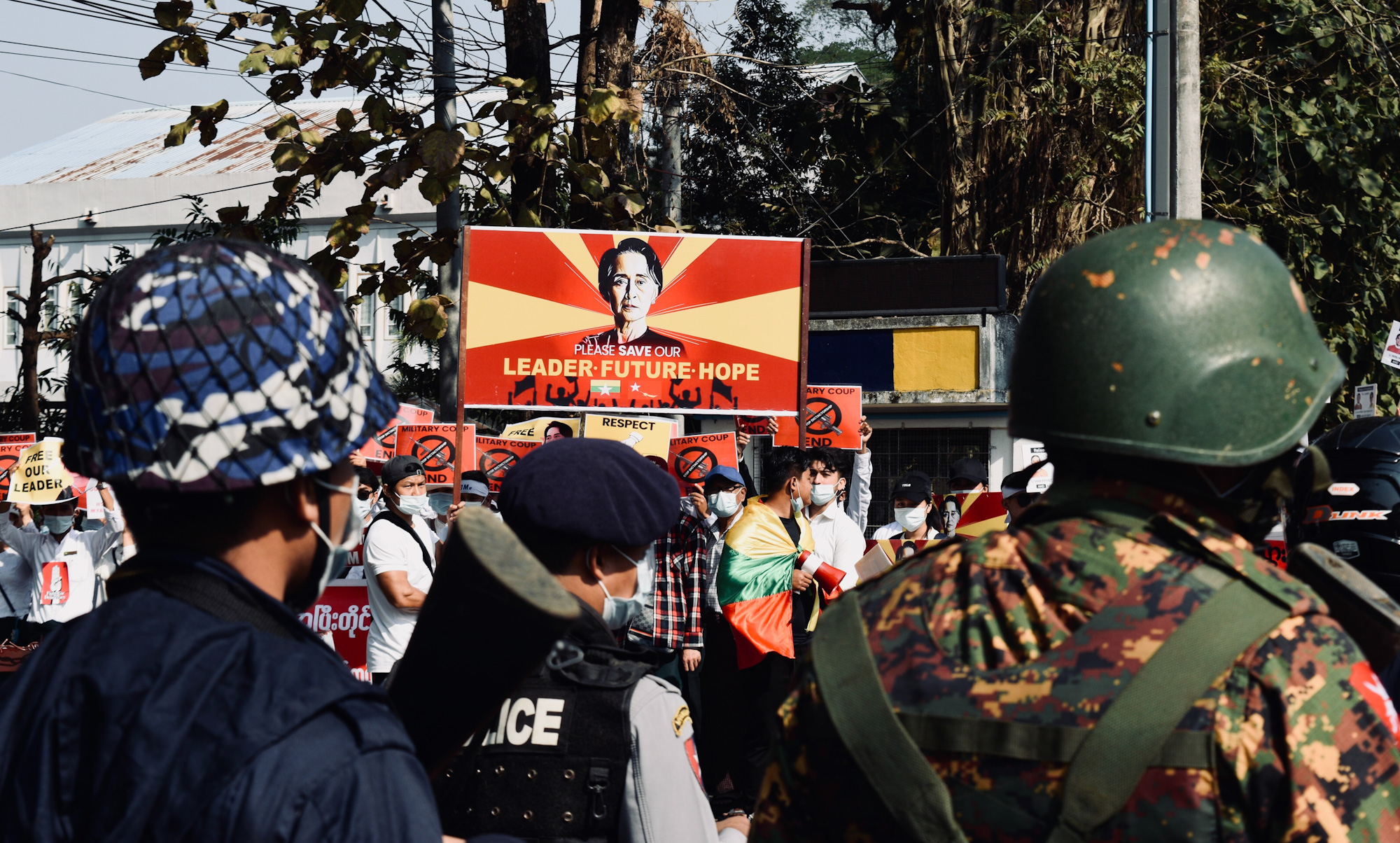
In pro-democracy uprisings around the globe—from the Philippines’ People Power Revolution to the collapse of Indonesia’s New Order to the fall of the Pinochet regime in Chile—defection of military and security forces to the side of the people has proven pivotal in weakening authoritarian regimes. These shifts in loyalty signaled to the public that cracks were forming within authoritarians’ support base and made it operationally challenging for their regimes to continue the mass repression needed to maintain power.
In Burma, military defections gained momentum following the February 1, 2021, coup, but have declined since late 2022. According to recent estimates by Burma’s National Unity Government (NUG), 12,327 members of the security forces—3,236 soldiers and 9,091 police officers—had defected as of February 2023, peaking at an estimated 100 defections per month in 2021. By late 2022, that rate had fallen to an estimated 10 per month, and we have not yet seen the kind of mass or senior-level defections that typically swing the balance of power in anti-authoritarian uprisings. Encouraging and supporting defectors and ensuring Burma’s democracy movement is equipped to maximize their intelligence and rhetorical value should be central to the victory strategy for the movement.
Barriers to Defection
Primary research on defections from Burma’s military reveals that while ideological and ethical considerations provide an impetus to leave, the lack of safety net is making would-be defectors stay. Three significant internal and external barriers are behind the dwindling number of defections:
- Security: In response to early post-coup defections, the junta has tightened security measures within the military to intimidate would-be defectors. Soldiers face the possibility of three to 10 years in prison, torture or even execution for abandoning post. Their families, too, face severe repercussions including ostracization and violence.
- Post-defection challenges and lack of adequate support: Defectors who manage to safely flee the military are met with a host of new challenges, including stigmatization and ostracization, loss of livelihood, and insufficient demobilization and reintegration support. Defectors are not welcomed into the resistance movement with open arms, particularly as most defect into ethnic resistance organization (ERO)-held territories where victimized ethnic minority civilians hold legitimate, decades-long mistrust of the Tatmadaw. Additionally, while some defectors simply switch sides in the armed struggle, those who wish to leave it altogether face economic hardship and challenges finding new means of supporting themselves and their families.
- Bamar-Buddhist nationalism and perceived ethno-religious threats: Soldiers and their families, who often reside with them on military bases, are highly isolated and prevented from accessing outside information, their social media and phone communication closely monitored. Within this context, soldiers and their families are heavily propagandized through junta-controlled media, which portrays the current conflict as an existential threat to the military’s defense of Burmese Buddhism and national sovereignty. Even if they are troubled by the military’s extreme brutality targeting civilians, including women and children, because of this powerful indoctrination, soldiers rationalize the junta’s ruthlessness and their own participation in it.
Reducing Barriers and Facilitating Safe Defection
Encouraging and facilitating defections should be central to the democracy movement’s victory strategy. Any successful plan should include:
- Strategic Counter-Messaging Campaigns: These should target key segments within the military, such as mid-level and senior officers, those in strategic locations in the country like Sagaing and Magway, and air force personnel engaged in airstrikes, which are essential to the junta keeping the upper hand in the conflict. Messaging should focus on improving soldiers’ awareness of off-base realities, diluting the military’s propaganda, and reassuring soldiers that it is possible to safely defect and establish lives outside the military.
- Recognize Defectors as Pro-Democracy Actors and Support their Effective Integration into Resistance Efforts: Defectors not only deprive the military of essential manpower but can offer crucial intelligence about military bases, operations, and capabilities. They can serve as credible messengers to encourage other would-be defectors and as rhetorical symbols to bolster morale among supporters of the democracy movement. In the long term, defectors can be key prosecutorial witnesses in future transitional justice efforts providing testimony to corroborate victims’ experiences and hold perpetrators of human rights violations and war crimes to account. Both defectors and those in the democracy movement need technical assistance to effectively utilize and integrate defectors into the movement. This should include training and support for systematic intelligence debriefing and strategic messaging campaigns that maximize defector visibility.
- Expand Humanitarian Assistance to Include Support for Defectors: As part of a broader expansion of humanitarian assistance for Burma, donors should increase resources for organizations providing defectors and their families transition support, including emergency shelter and food, reintegration and job skills training, and mental healthcare.
- Strengthen Democratic Forces in Bamar-Majority Areas: Overcoming Bamar-Buddhist nationalism as a barrier to defection is a complex challenge. However, strengthening democratic resistance control and administrative capacity in Bamar-majority areas, particularly in Sagaing and Magway, may provide a lower-barrier option for would-be defectors who are turned off by the idea of sheltering long-term in an ERO-controlled area. Stronger resistance control over Bamar-majority areas would provide defectors with an option where they could more quickly adapt and restart their civilian lives in areas with a shared ethno-religious background.
Conclusion: Supporting a Democratic Trajectory
Defections are a strategic imperative for Burma’s democracy movement. Defectors deny the junta manpower, weaponry, and munitions, and provide crucial intelligence on military operations, raids, and airstrikes that can both save lives and improve the effectiveness of armed resistance forces. For Burma’s democratic resistance, victory is likely impossible without defectors, and defection is impossible without providing incentives to soldiers to accept substantial risk and join the cause. Timely and strategic international assistance can both help make these incentives more attractive and ensure that defectors become assets that contribute to the eventual success of the democracy movement.
Top